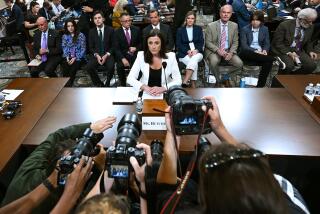Bush Denials on Hostages Questioned : Politics: Rep. Hamilton says there is no ‘credible’ proof of Iran-Casey deal. But he contends the President’s response raises disturbing issues.
- Share via
WASHINGTON — A key House Democrat said Friday that President Bush’s “limited” denials raise disturbing questions about allegations that officials from Ronald Reagan’s 1980 campaign sought to delay the release of American hostages held by Iran until after the election that turned Jimmy Carter out of the White House.
Rep. Lee H. Hamilton (D-Ind.), who has been supervising a low-key congressional inquiry into the allegations at the request of the House Democratic leadership, said that investigators have evidence of alleged contacts between Iranian officials and the late CIA Director William J. Casey, who was Reagan’s campaign director. But he added that there still is no “credible” proof that either a deal was made or that anyone other than Casey may have been involved.
The allegations, which revolve around reports that Casey may have sought to prevent a Carter victory by delaying the release of the 52 hostages held at the U.S. Embassy in Tehran, first surfaced in the aftermath of the 1980 elections. Never proven and repeatedly denied by the Reagan White House, they resurfaced recently when former Carter national security aide Gary Sick said that he had uncovered new evidence of a series of secret meetings involving Iranian officials, Casey and Bush himself.
Sick, who discussed the allegations with Hamilton and other lawmakers at two closed hearings in the last month, said that he was told by several anonymous participants that Bush attended one of the final meetings at a Paris hotel in October, 1980.
Hamilton, breaking his silence on the congressional inquiry at a breakfast meeting with reporters held by the Christian Science Monitor, said that no credible evidence has yet been offered to support the allegation that Bush attended the Paris meeting. He said also that, although there is “evidence of a meeting between Casey and representatives of the Iranian government,” there is “at this point no evidence, to my mind, of a deal ever having been struck.”
However, Hamilton said he is troubled by the fact that Bush so far has only denied that he participated in the alleged Paris meeting, while leaving other aspects of the allegations unanswered.
“I accept the President’s word (about the Paris meeting),” Hamilton said. “But what is significant about the denial is how limited it was. He denied only that he was in Paris. He did not deny that Bill Casey was there. He did not deny that they were seeking contacts” with the Iranians. “In my mind,” he added, “that leaves a lot of questions hanging.”
Hamilton, who heads the House Foreign Affairs Middle East subcommittee, conceded that serious doubts still surround the credibility of most of the evidence examined so far by congressional staff members, who have been asked by House Speaker Thomas S. Foley (D-Wash.) to determine whether a more formal investigation is warranted. “There is evidence of these things, but how credible it is I am not able to assess at this point,” Hamilton said.
But the influential Democrat, whose recommendations may help decide whether a formal investigation is begun, said of the Bush denial:
“It raises a lot of questions. If he (Bush) really wanted to put this thing to rest, why didn’t he deny all of it?” Hamilton noted that the White House has not yet denied the allegations that Casey met with the Iranians or that Reagan or Bush ever knew of the alleged affair.
When asked about the issue, White House Press Secretary Marlin Fitzwater refused to expand on Bush’s earlier statements. “We’ve said all we’re going to say on this matter,” Fitzwater said. “There’s nothing to it. Simple as that. We’re not going to get into this foolishness.”
Hamilton refused to predict what the House leadership will do after the staff, conducting its inquiry in secrecy over the last two weeks, completes its work and submits its final report. Sources close to the investigation said that they expect the report to be completed late next week. The leadership then will have to decide whether to proceed with a more formal investigation, which would include subpoenaing witnesses to appear before either a congressional committee or an independent panel empowered to act for Congress.
Concerned that such an investigation could backfire politically, given the explosive nature of the charges, some Democrats appear to favor the latter approach, while others clearly are not eager for an investigation at all unless the evidence is strong, sources close to the inquiry have said.
More to Read
Get the L.A. Times Politics newsletter
Deeply reported insights into legislation, politics and policy from Sacramento, Washington and beyond. In your inbox twice per week.
You may occasionally receive promotional content from the Los Angeles Times.










